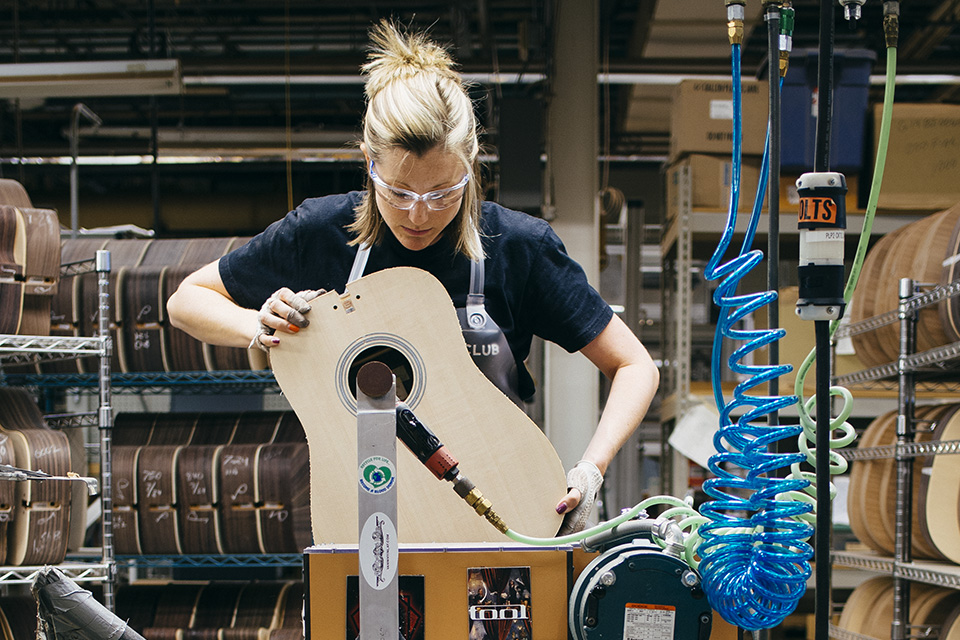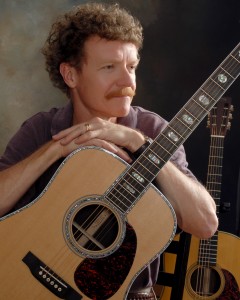Welcome to An American Place
This page carries on from the department of the same name on the back page of every issue of American History magazine. Here you’ll find additional material, including videos, interviews, slideshows, and other content that drills deeper into the subject at hand, which in the October 2016 issue is C.F. Martin & Co., maker of Martin guitars.
Q&A: Christian F. Martin IV
C.F. Martin Sr., who immigrated to the United States from Saxony in what is now Germany, founded the Martin Company in 1833. Five generations of descendants and more than two million guitars later, another C.F. Martin heads the family business. In an exclusive interview with American History, Christian Frederick “Chris” Martin tells of growing up in the family trade, the challenges of being the steward of an American institution, and the pleasure of working in a setting steeped in such historic tradition.
American History: What was your first encounter with a guitar?
Chris Martin:My parents divorced, and I lived with my mother in New Jersey. In the summer I would spend time in Nazareth. At camp, I heard a counselor playing folk songs and thought, “I’d like to do that.” That Christmas my father and grandfather gave me a small Model 5-18 with nylon strings. My mom got me lessons—in classical guitar. My teacher took out this footstool and asked me to put my left foot on it and hold my thumb behind the neck, Segovia-style. I never practiced, and that was that. However, a few years ago a local university gave me an honorary doctorate in music, so it all worked out.
American History: What is your earliest recollection of the factory?
Chris Martin: One summer my grandfather had me work with Donald Fritz cutting mahogany. Mr. Fritz was using a bandsaw to cut boards four inches by eight inches by seven feet into trapezoids to be sawn for guitar necks. He gave me a stick. When he made a cut my job was to push the scrap into a Dumpster. I don’t think the Occupational Safety & Health Administration would take kindly to a 12-year-old doing that, but those were different times.
American History: What was your path to the CEO’s chair?
Chris Martin: In some family businesses, children spend so much time working it turns them off. That wasn’t my experience; I was curious about guitar manufacturing. I wound up going to UCLA. A friend of my father’s, Fred Walecki, had a store, Westwood Music, in LA. Fred offered me a sales job. I knew nothing about guitars, and you can imagine what it was like having Martin for a last name in that situation. Fred moved me into his repair shop, where I learned from a great guy, John Carruthers. My brother came out, and we drove back to Nazareth. I went to work in the factory from department to department, seeing guitars being made by people who knew what they were doing and doing it well.
American History: You eventually went back to school.
Chris Martin: The local community college had just opened, and my grandfather encouraged me to go to night school, after which I went to Boston University for an undergraduate business degree. In one class we were discussing the high quality of Japanese automobiles, and the professor explained how Americans like Edwards Deming taught the Japanese about designing quality into products, making continuous improvements, rather than trying to inspect quality in. That stuck with me.
American History: Even Martin Guitar runs into slumps.
Chris Martin: You bet, and we hit one in the late `70s. Thanks to disco and synthesizers, demand for acoustic guitars dropped. I came back from Boston with ideas about Deming-style continuous improvement, and because of the market there was willingness here to shift gears. My dad retired; my grandfather died. I became CEO and president, positions I held for eight years before hiring a president. I’ve been CEO for 30 years.
American History: Did continuous improvement end that slump?
Chris Martin: Continuous improvement is very important, but it’s more important to be lucky, and we were. We had just worked in this new quality regimen when MTV debuted Unplugged. Now we have groups like Mumford & Sons, the Avett Brothers, Ed Sheeran, Jason Isbell, and many more. You can’t move the market, the market moves you.
American History: What has it meant to inherit an institution?
Chris Martin: Martin is a stewardship and a team effort; people work here because they want to be part of something durable.
American History: Detractors say Martins aren’t what they used to be.
Chris Martin: Old Martins sound great, but they can be problematic, especially if you grew up on electric guitars. It’s hard to take a run up the neck. Bob Taylor figured a way to make an acoustic neck play more like an electric guitar’s. We gradually moved in that direction. You can get a great sound out one of those 1930s-era Martin cannons, but you can also buy one new that has an easier-to-play neck—and a lifetime guarantee.
American History: A 2015 film featured a vintage Martin being wrecked—by accident.
Chris Martin: The producers of Hateful Eight borrowed an 1870 Martin from our museum for a scene that was to end with the instrument being smashed. On the first take Kurt Russell grabbed the Martin and, without waiting for the switch, smashed it. Now, if you’re a filmmaker needing a vintage instrument, we will make a replica for you. But we no longer loan vintage instruments for movies.
American History: There’s no way to make a 50-year-old guitar. Has Martin ever been tempted to hold models until they become “vintage?”
Chris Martin: We save the first guitar in a series, not for sale but as an example if we need data. And some guitars we have acquired later—during the Golden Era, no one said, “Hey, let’s save a D-45 in a case for a museum!”
American History: What does globalization and regulation mean for Martin?
Chris Martin: The 2008 federal Lacey Act amendments on wood and other products spell out what is permissible in buying timber. Previously the legal considerations were fuzzy, but now there’s a law, and we can see clearly what we can and cannot do.
American History: How about California regulators ruling that Martin cannot say its guitars are made in the USA because you get some parts abroad?
Chris Martin: We sell a lot of guitars in California. We decided we could spend years fighting that or we could make our peace with it, so we rephrased our label. The irony is that when we sell overseas in places like Korea, we must list a country of origin, so at the end of the delivery line the last thing we do is attach a label saying “Made in the USA.”
For a Martin documentary on the company’s guitars, click here: The Ballad of the Dreadnoughts






